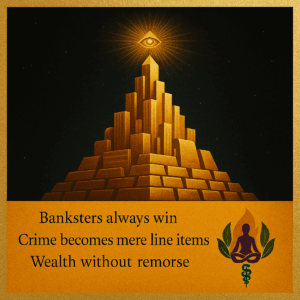 Whitney Webb’s One Nation Under Blackmailreads less like conspiracy theory and more like a forensic autopsy of empire. She documents how organized crime, intelligence agencies, and global finance merged into a single self-protecting organism; one that made Jeffrey Epstein not an anomaly but an inevitability.
Whitney Webb’s One Nation Under Blackmailreads less like conspiracy theory and more like a forensic autopsy of empire. She documents how organized crime, intelligence agencies, and global finance merged into a single self-protecting organism; one that made Jeffrey Epstein not an anomaly but an inevitability.
In One Nation Under Blackmail, investigative journalist Whitney Webb traces the incestuous relationship between organized crime, intelligence services, and elite finance from Prohibition to the present day.
Her premise is stark: the line between government secrecy and criminal enterprise blurred long ago, creating a shadow network that trades in information, influence, and exploitation.
Epstein’s blackmail operation, she argues, was not a rogue enterprise but a continuation of a strategy perfected over decades; the weaponization of sexual compromise to secure political and financial loyalty.
Webb threads the story through Roy Cohn’s “favour bank,” Cold War intelligence deals, and the rise of Israeli and American espionage partnerships, showing how blackmail became a pillar of modern power.
The book’s most unsettling insight is that this architecture of control is structural, not accidental. Intelligence agencies rely on organized crime to do what cannot be done in daylight. Banks rely on intelligence to protect illicit flows of capital. Politicians rely on both to stay in power. Each shields the other in a closed loop of secrecy and reward.
When Epstein’s name surfaced, the system didn’t collapse: it reinforced itself. Settlements were paid, evidence disappeared, networks rebranded, and the game resumed. The lesson, Webb implies, is that accountability is impossible inside a structure built on blackmail.
For readers willing to follow her exhaustive documentation; thousands of citations connecting mobsters, CIA assets, Wall Street financiers, and political dynasties; the reward is clarity: a map of how corruption becomes governance, and why exposure alone changes nothing.
Epstein was a symptom. The disease is institutionalized deceit masquerading as national security.
For those who prefer to listen rather than read, there are numerous long-form interviews and podcasts with Whitney Webb on YouTube and other platforms, where she explains her research in clear, accessible language. Hearing her speak reveals both the depth of her documentation and the calm precision with which she connects the dot; a refreshing contrast to the sensationalism surrounding the Epstein case. Her voice makes it easier to grasp that this is not a story about one man’s crimes, but about a system built to conceal them.
